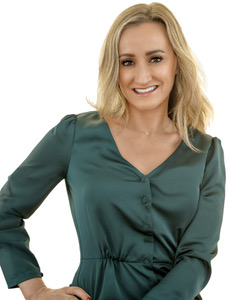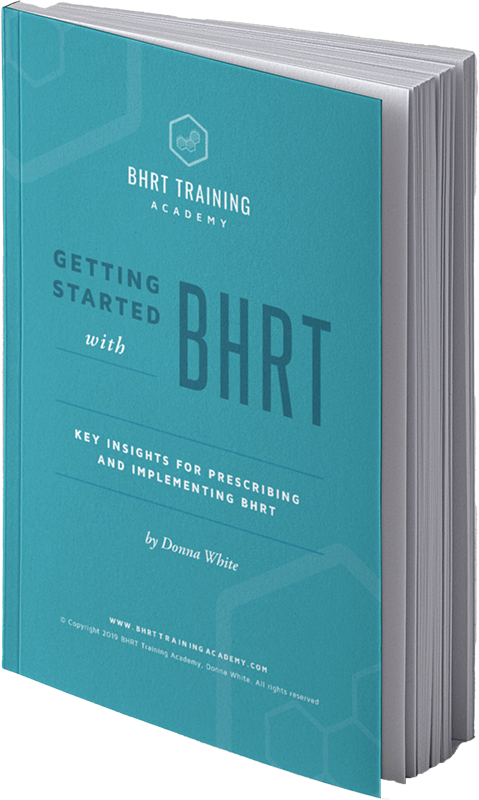BHRT Provider Spotlight: Erin Gagne

Here’s her story of how she got into bioidentical hormones and antiaging medicine.
Erin’s Background

Erin is originally from Rhode Island but moved to South Carolina in 2008 due to a hiring freeze up north.
Her experience includes:
- Being a nurse is critical care, specializing in cardiovascular ICU
- Being a family nurse practitioner working with kids
- Working in internal medicine with elderly populations
- Being a Diplomat of Anti-aging, metabolic, and functional medicine fellowship through A4M
- Becoming Board-certified through the American Board of Anti-aging Health Practitioners
- Working as a Manager of Clinical care for BodylogicMD affiliate network
- Being Certified in O-shot and P-shot injections by Charles Runels, MD
- Becoming trained in CIRS and mold-related illness through Dr. Ritchie Shoemaker
After trying out various positions, she decided she wanted to be on the preventative side of care. (Erin’s words are in italics.)
When I first became a nurse practitioner, I practiced internal medicine and wrote 25 narcotic scripts a day. I asked myself, is this what I trained all these years for?
I later worked with a physician that wanted to add a weight loss program…we did a lot of stem cell and PRP for joint injuries. This was around the time I was introduced to Donna and her training academy. Before that, I didn’t know anything about hormones. I knew the endocrine system scared me because it’s so complex, but I really fell in love with hormones then, and then I just kept continuing my education from there.
One reason she decided to continue her training was because of a personal illness. After a year of being sick with GI symptoms she discovered that she had Ulcerative Colitis (UC).
Here’s what she learned from that and why it led her to become a BHRT provider:
I always ask why, why is this happening? Why has your body decided to attack itself within and so I asked my doctor if there are dietary things I can do, but my doctor told me no, diet does not have a direct correlation [to ulcerative colitis]. I decided that it was best to go on my own personal journey to learn more about functional medicine. I’m not telling people to come off their UC medications, but I now feel the best I’ve ever felt.
She discovered through her journey that things like nutrition, supplements, and hormones can be directly linked to cardiovascular health, and this knowledge helps her offer better answers to her patients.
Empathy is one thing that you can’t be taught. When you’re going through things yourself, you understand more about how your patients feel. You want to do everything you can to help them because you truly know what they’re going through.
Interview with Erin Gagne
Donna: How has learning about hormones impacted you as a health provider?
Erin: First and foremost, what I learned about hormones is that they affect every single system in the body.
The body wants to be in balance. Whether it’s a hypo-functioning thyroid preventing someone from getting pregnant, or low progesterone causing heavy cycles that may cause someone to have an unnecessary hysterectomy, there are so many different things that happen with our hormones when they’re out of balance.
In the past, I may have just placed a woman on an antidepressant medication instead of realizing that she had hormone problems.
Learning this has prevented me from treating people inappropriately. I know now that we need to look at their hormones and the whole picture, not just sex hormones but cortisol and the complete components of the thyroid.
As a BHRT provider, I know now that treating the patient as a whole is what hormones represent. Now, I look at the whole picture.
Learning about hormones has been truly life-altering for me, but also for my patients. I love hearing the gratitude in their voices.
If there are imbalances that can lead to so many symptoms, which affect so many aspects of their life. As providers, we give them hope.
By the time the patient gets to you as a BHRT provider, often they’ve been to many other health care professionals. Whether it’s a heavy period or depression or whatever, you, as the provider specializing in hormones, can truly change their quality of life.
I am so glad you’re getting the word out. I just feel like so many providers don’t understand that they can prescribe BHRT. It is safe, and it’s life-changing.
As BHRT providers, we are always working on ourselves. When I was sick, my hormones were depleted. I used progesterone and testosterone to support myself and that gave me the energy to get my strength back.
I think when your hormones are so depleted, you don’t even have the energy to want to exercise or to lose weight.
When you get somebody’s hormones back in the balance, whether that’s addressing the HPA axis or thyroid, it affects everything else and the rest of their symptoms.
As a BHRT provider, I think the most challenging patients are perimenopausal women because their hormones fluctuate so much.
I always tell them that things are going to fluctuate. We’re going to constantly re-evaluate until we get it right, and what works for one person doesn’t work for others.
Donna: A long time ago, when you originally went through our pilot programs, you said that going through our program and learning about hormones made you fall in love with medicine again. I’ll never forget that. Do you still feel that way as a BHRT provider?
Erin: Yes! And more so. I feel excited to wake up each day to do my job. It took me a long time to get there. Hormones have helped with that.
Donna: What would you say to a provider who is thinking about learning bioidentical hormones?
Erin: I would say just do it!
I think if you get into it, you will realize how much you love learning about hormones. You’ll be able to apply that to your job and feel like you’re giving something so important to your patients and also getting something back from your job. It is just totally worth it. Donna’s BHRT provider training is amazing.
I’m in my mid-thirties, and I realize I have 30 more years to work, so now I’m in a place where I love my job; I get to make an impact for that long.
The pace is more enjoyable than conventional medicine. I feel I have time to get to know patients, get to know what they have gone through, and address long lists of symptoms.
For my initial consultation, I have an hour and 15 minutes. I want to provide a space where these patients feel safe and that they can share the information with me — the more information I have, the better I can provide for them.
I get to ask them what is their goal, what’s the main thing they want to fix, what’s the biggest thing they want to address, and then I can determine how we need to fine-tune their plan of care. For me, the biggest thing is taking time to educate them because we often give them three to four different things like estrogen or progesterone and sometimes and thyroid and then supplements to help with adrenals, and so it’s very overwhelming for them. So being able to take the time to educate them is crucial. I also help patients with lifestyle changes. As a BHRT provider, I have time to work on all of that.
I feel like if you’re not learning, you’re not growing, and really you’re not living; I love just constantly learning, and it’s rewarding to work with the patients, but it’s also financially rewarding as well since this is a cash practice modality.
Donna: What do you wish somebody had told you when you first got into this?
Erin: Find a mentor, someone that you can run ideas by and talk with and share case studies.
Also, I think understanding that it’s not cookie-cutter, so you know, just like I said, what works for one person may not work for another. You have to look at the individuality of a patient and think about what needs to happen and know that sometimes there’s a couple of different plans that could work. Sometimes you may want to go slower and maybe not start everything at once. In your initial treatment plan, you don’t get it right, but you have to start somewhere and see how the patient responds.
There are many different ways to do BHRT. Learn from many different people. Another thing I would suggest is setting realistic expectations for your patients — for instance, let them know that the dose I put you on today may need to be tweaked.
Donna: I have never met a BHRT provider that regretted learning and getting into BHRT. What would you say to that?
Erin: Agree 100%. Do you want to become a BHRT provider?
If you’re interested in becoming a BHRT provider who loves their job as much as Erin, and you want to move forward on this fascinating journey, drop me a line!
Enjoyed this article? Here are three more to help you:
How To Grow Your Integrative Medicine Practice
5 Reasons You Should Learn to Prescribe Bioidentical Hormones
Bioidentical Hormone Replacement Therapy: Frequently Asked Question

Get the quick read ebook,
Getting Started with BHRT -
Key Insights to Prescribing and Implementing BHRT.
CME's - Earn while you learn.
